|
"I have looked
over Gerald Massey's Poems ―
They seem to me zealous, candid, warlike, ― intended, as they surely
are, to get up a strong feeling against the British aristocracy both
in their social and governmental political capacity."
Walt Whitman, 1855.
_____________ |
|
"His revolutionary lyrics have done
their work. The least that can be said for them is, that they
are among the very best inspired by those wild times when Feargus
O'Connor, Thomas Cooper, James [Bronterre] O'Brien and Ernest Jones
were in their glory. Of their effect in awakening and, making
all allowance for their intemperance and extravagance, in educating
our infant democracy and those who were to mould it there can be no
question."
From...
The Poetry of Mr. Gerald
Massey by John Churton Collins, 1905.
_____________ |
|
"No one ever understood the mythology
and Ritual of Ancient Egypt so well as Gerald Massey since the time
of the Ancient Philosophers of Egypt."
Albert Churchward—Preface to
Signs and Symbols of Primordial Man.
_____________ |
Pleasantly the Chime that calls to
Bridal-hall or Kirk;
But Hell might gloatingly pull for the peal
that
wakes the babes to work!
"Come, little Children," the Mill-bell rings,
and
drowsily they run,
Little old Men and Women, and human
worms who
have spun
The life of Infancy into silk; and fed, Child,
Mother, and
Wife,
The factory's smoke of torment, with the
fuel of
human life.
O weird white face, and weary bones, and
whether
they hurry or crawl,
You know them by the factory-stamp, they
wear it one
and all.
The Factory-Fiend in a grim hush waits till
all are in,
and he grins
As he shuts the door on the fair, fair world
without,
and hell begins! |
. . . . life in Tring's Silk Mill, from
Lady
Laura
|
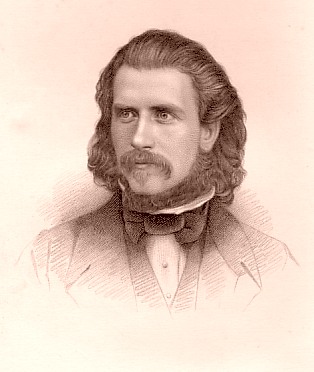 |
|
GERALD
MASSEY
(1828 - 1907)
Poet, author, lecturer and Egyptologist. |
|
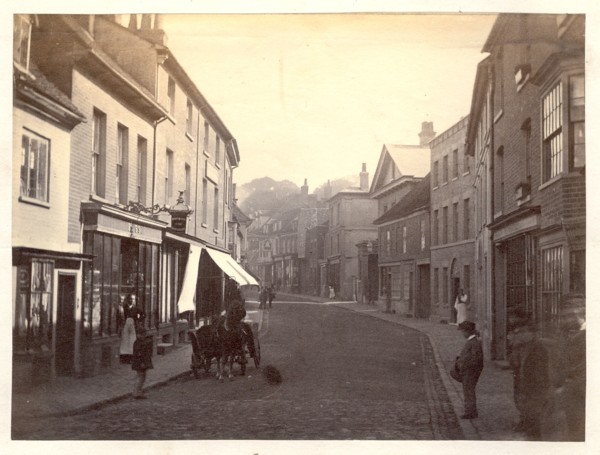 |
|
19th Century view of Tring High Street.
Photograph: Wendy Austin collection. |
|
Not by appointment do we meet delight
Or joy; they heed not our expectancy;
But round some corner of the streets of life
They of a sudden greet us with a smile.
Massey from....The
Bridegroom of Beauty |
|
|
Known in his
home town (in Hertfordshire, England) as "Tring's Poet", this extraordinary
man's enduring reputation rests more on his unparalleled ability to piece
together historical connections between cultures than on his poetry, which dates
mainly from the early part of his life. It is impossible to
categorise GERALD MASSEY
comfortably under one heading, for at different times he succeeded as a . . . .
|
Chartist and journalist,
writing in radical publications such as The Uxbridge Spirit of Freedom,
The Red Republican
and The Friend of the People (see
also
W. J. Linton,
W. E. Adams and
Karl Marx on 'Chartism'; 'What
Chartism Is' and 'James
Watson, a Memoire'). In 1886, Massey returned briefly to the
hustings, publishing a set of satirical "Election
Lyrics," which offered support to Gladstone and his
ill-fated Bill to give home-rule to Ireland;
Poet, his poetry also being published widely in North
America. In much of his poetry—particularly
his early verse—Massey protests about the lack of sorely-needed
political and social reform (see the
Poetry
section);
Essayist and poetry critic for
various Victorian
periodicals—particularly on poetry for the
Athenæum (see the
Prose
and Critical Reviews sections);
Shakespearean researcher into the
background to the Sonnets (Shakspeare
and his Sonnets;
The Secret Drama
of Shakspeare's Sonnets);
Lecturer on a wide range of subjects. During his early years,
Massey
concentrated mainly on poets and literary
personages, but later he lectured increasingly on
mythology and the origin of religious beliefs, and
on spiritualism, subjects that became absorbing interests and were—and continue—to damn him in the eyes of many;
Researcher into
the influence of ancient Egyptian beliefs on the development
of western myth, symbol, language and religion (Judaism and
Christianity—see 'Nile Genesis').
Throughout his works, when examining racial mythology, Massey
places particular emphasis on ancient Egyptian myths,
maintaining that
these developed as a necessary and fundamental central core of
belief from the earliest times, and are the roots of modern cultural
origins. He maintains that myths were founded on natural phenomena and remain
the register of the earliest scientific observation and 'the mirror of prehistoric sociology.' |
|
". . . . much
of the Christian History was pre-extant as Egyptian Mythology. I have to
ask you to bear in mind that the facts, like other foundations, have
been buried out of sight for thousands of years in a hieroglyphical
language, that was never really read by Greek or Roman, and could not be
read until the lost clue was discovered by Champollion, almost the other
day! In this way the original sources of our Mytholatry and Christology
remained as hidden as those of the Nile, until the century in which we
live."
From
Massey's lecture....
'The
Historical Jesus and the Mythical Christ'
|
Few Christians realise that the Gospels contain many points of similarity with ancient
Egyptian teachings; indeed, that they might even have been derived from
much earlier ancient Egyptian religious ritual. During the later
years of his life — from about 1870 onwards — Massey became increasingly
interested in the similarities that exist between ancient
Egyptian mythology and the Gospel stories. He studied the extensive Egyptian records housed in the British Museum, eventually teaching
himself to decipher the hieroglyphics. Following years of diligent research into
the history of Egyptian civilisation and the origins of religion, Massey
concluded that Christianity was neither original nor unique, but that the roots
of much of the Judeo/Christian tradition lay in the prevailing Kamite (ancient
Egyptian) culture of the region. By demonstrating such links are
plausible, Massey inevitably places a question mark against the
strict historical veracity of the Gospels. In the view of Dr. Alvin
Boyd Kuhn
(1880-1963), a scholar of
comparative religion who was much influenced by Massey's research:
"We
are faced with the inescapable realisation that if Jesus had been able to read
the documents of old Egypt, he would have been amazed to find his own biography
already substantially written some four or five thousand years previously."
Massey published the results of his extensive research in his 6-volume "trilogy" on the origin of
man, of civilization and of western religions—"I began my study in
1870, with the idea, which has grown stronger every year, that the human
race originated in equatorial Africa." (Massey derived an
etymology from the Egyptian af-rui-ka, "to turn toward the
opening of the Ka." The Ka is the
energetic double of every person and "opening of the Ka"
refers to a womb or birthplace. Africa would be, for the
Egyptians, "the birthplace").
But despite
today's growing interest—the books
are again available in facsimile reprint
editions—at the time of their publication the trilogy failed in
popularity due mainly to the contentious subject matter; however, it
must also be said that some of Massey's theories are poorly defined and so
supported with detail that readers found them difficult to understand.
Lacking any formal education — particularly with
regard to the need to evaluate and record his sources — and the services
of an editor, it is unsurprising that Massey's research attracted criticism, not just
with regard to the controversial nature of his conclusions but
due to a lack of clarity in how he reaches them. In:
The Book of the Beginnings,
published 1881, Massey
challenges conventional opinions of race supremacy;
The
Natural Genesis, published in 1883, Massey delves deeper into
ancient Egypt's influence on modern myths, symbols, religions and
languages. By proclaiming Egypt to be the birthplace of modern
civilisation, Massey challenges conventional theology as well as
fundamental notions of race supremacy;
Ancient Egypt: The Light of the World, published shortly before his
death in 1907 and by far Massey's most
important work, he concludes that Kamite thought was the direct progenitor of the philosophy, meta
physics, religion and science that eventually shaped Western
civilisation. "It is a work which has occupied me over thirty
years, and I shall be well content if in another century my ideas are
acknowledged as correct".
―――♦―――
Although
now largely overlooked, during the mid-Victorian era Massey was
considered a significant poet, both in Britain, where he achieved the
distinction of being awarded a civil list pension, and in North America, where he
was published widely in both books and periodicals. |
|
A happy island in a
sea of green,
Smiling it lies beneath the changing sky,
Well pleased, and conscious that each
wave
and wind
Is tempered kindly or with blessing rich:
And all the quaint cloud-messengers that
come
Voyaging the blue Heaven's summer sea,
Soft, shining, sumptuous, blown by
languid
breath,
Touch tenderly, or drop with ripeness
down.
Spring builds her leafy nest for birds and
flowers,
And folds it round luxuriant as the Vine
When grapes are filled with wine of merry
cheer:
The Summer burns her richest incense
there,
Swinging the censers of her thousand
flowers:
Brown Autumn comes o'er seas of glorious
gold:
And there old Winter keeps some greenth
of heart,
When on his head the snows of age are
white.
from....
'Craigcrook
Castle' |
|
It fell upon a
merry May morn,
I' the perfect prime of that sweet time
When daisies whiten,
woodbines
climb,—
The dear Babe Christabel was born . . .
The birds were darkling in the nest,
Or bosomed in voluptuous
trees:
On beds of flowers the happy
breeze
Had kissed its fill and sank to rest . . .
We sat and watched by life's dark stream,
Our love-lamp blown about the
night,
With hearts that lived, as
lived its
light,
And died, as did its precious gleam . . .
She thought our good-night kiss was
given,
And like a flower her life
did close.
Angels uncurtained that
repose,
And the next wakening dawned in
Heaven . . .
from....Babe
Christabel |
|
No
jewelled beauty is my love,
Yet in her earnest face,
There's such a world of tenderness,
She needs no other grace.
Her smiles, her voice, around my life
In light and music twine;
And dear, O very dear to me
Is this sweet Love of mine.
from....No
Jewelled Beauty Is My Love |
|
Come hither my brave Soldier
boy, and sit
you
by my side,
To hear a tale, a fearful tale, a glorious
tale
of pride;
How Havelock with his handful, all so
faithful,
and so few,
Held on in that far Indian land, to bear
our
England through
Her pass of bloodiest peril, and her reddest
sea
of wrath;
And strode like Paladins of old on their
avenging path.
from....Havelock's
March |
|
Massey's best poetry leans toward
the tender side of nature—often painting a succession of beautiful,
even extravagant vignettes—and to romantic scenes close to home.
Examples in this category are the ballad Babe Christabel, Massey's best-known long poem, in which he gently relates the birth, life and
death of a young child; in The Singer,
he pictures a skylark, singing softly and sweetly as it soars up into
the heavens, but the ripe, drooping ears of corn below are deaf to its song; in My Love,
Massey muses lovingly on his
wife's perfections and imperfections, a poem that I suspect makes a candid
statement of devotion for his first wife Rosina, whose imperfections
gradually became legion but who he never abandoned. There's
No Dearth of Kindness, which takes as its theme brotherly love,
is probably Massey's best-known short poem, its first four lines often appearing
in dictionaries of
quotations.
In stark contrast is Massey's political poetry, among his earliest
and arguably his
best. These exhortatory, fiery
protests, written mostly for publication in unstamped Chartist and
working-class newspapers of the period (1847-52), reflect the wrongs suffered by the masses
(A Red Republican Lyric),
their bitterness (Yet we are
Brothers Still) and utter hopelessness of a better life (Hope
On, Hope Ever!) and they display much force and vitality in the
process. Conveying as they do the feelings and sentiments of the
oppressed poor, Massey's political poems are of interest to social historians
of the period, while examples often
appear in compilations of Victorian working-class verse. For
further examples see
Early Poems and Voices of Freedom and
Lyrics of Love.
Occasionally, Massey takes as his subject a patriotic or, perversely for a champion of the
downtrodden, an imperialist episode, such as
Sir
Richard Grenville’s Last Fight, The
Death Ride and Havelock’s
March. The latter is a long narrative of the Indian Mutiny,
which Massey described as
"more properly historic photographs, rather than Poems in the Esthetic
sense" that "may have their place as illustrations in historic
records"; a perceptive comment. It's interesting to compare the first
two of these examples with Tennyson’s popular treatment of the same themes in 'The
Revenge: A Ballad of the Fleet' and in 'The Charge of the Light Brigade'.
Whereas Tennyson paints his pictures with rich but delicate strokes, Massey's
are more confused and indistinct, his poems a maze of figures. In the
opinion of a critic
writing in the Bucks
Advertiser (May, 1847), when Massey left nature and took to
the battlefield, "his sentiment is coarse, and the phraseology vulgar."
He would have done well to have taken note, for Havelock's March and
similar poems, while providing interesting views
on the headline events and sentiments of the time, are not among his best.
Craigcrook Castle,
which was
composed during 1855 when Massey held an editorial post on the Edinburgh News,
and A Tale of Eternity,
a ghost story published in 1870— and his last significant poem—are
among Massey's most accomplished poems in blank
verse.
A number of Massey's poems were set to music and
proved popular, both as hymns and songs; judging from the number of
composers that set the piece and the number of copies that remain
in circulation, No Jewelled
Beauty is my Love seems to have been a particular
favourite (it's certainly one of mine). But having sold the
copyright of his poetry to the publishers, I doubt whether Massey ever
received any royalties from the
sheet music sales.
Despite
its failings, strength and sincerity
always shines through in Massey's poetry
placing it above mere poetic merit. Of
course much of it is dated, for the concerns and conflicts
that he and his Chartist and Radical contemporaries faced, often addressing in their
verse, have long since receded below our horizon. Their battles
against
child labour, appalling factory and social conditions, the right to
protest without the fear of brutal reprisal, gender inequality and the
lack of universal suffrage, to name but some, were fought
long and hard and eventually won to our benefit (although our civil
liberties are again at risk from the all-seeing eye of modern technology
and from those who operate it!). Sadly, these
battles and those who fought them are now historic footnotes, or are forgotten.
Tennyson, who Massey greatly admired — they
met once, towards the end of the Laureate's life — described him as
"a poet of fine lyrical impulse and of a rich,
half-Oriental, imagination". . . . possibly Gerald Massey’s finest
eulogy as a poet. |
|
FOR TRUTH.
(Gerald Massey's last known poem).
He set his battle in array, and thought
To carry all before him, since he fought
For Truth, whose likeness was to him revealed;
Whose claim he blazoned on his battle-shield;
But found in front, impassively opposed,
The World against him, with its ranks all closed:
He fought, he fell, he failed to win the day
But led to Victory another way.
For Truth, it seemed, in very person came
And took his hand, and they two in one flame
Of dawn, directly through the darkness passed;
Her breath far mightier than the battle-blast.
And here and there men caught a glimpse of grace,
A moment's flash of her immortal face,
And turned to follow, till the battle-ground
Transformed with foemen slowly facing round
To fight for Truth, so lately held accursed,
As if they had been Her champion from the first.
Only a change of front, and he who had led
Was left behind with Her forgotten dead. |
―――♦―――
|
"Poverty is a cold place to write
Poetry in….. A poor man, fighting his battle of life, has little
time for the rapture of repose which Poetry demands….. Considering
all things, it may appear madness for a poor man to attempt Poetry
in the face of the barriers that surround him." |
Born in a hovel at Gamnel Wharf, Tring, on 29th May 1828, (THOMAS)
GERALD MASSEY was the eldest son of an impoverished and illiterate
canal-boatman. Massey said of himself that 'he
had no childhood,' for on
reaching the age of eight he was put to work in the Town’s silk mill where his twelve-hour days spent labouring in grim conditions added between nine
pence and one shilling and three pence to his father's meagre earnings. He later worked in Tring’s then-thriving straw
plaiting industry producing braid for the straw hat trade in nearby Luton and
Dunstable. Thanks to his mother, Mary, Massey received a scant education at a
“penny school”. Despite these tough beginnings, he learned to read
and write using the Bible, Bunyan, Robinson Crusoe and Wesleyan tracts left at
the family home. |
|
Torn from mother's arms to labour,
Fragile limbs in childhood's day—
Soon the cherub lines of beauty
From their pallid cheeks decay;
And the cankerworm of death
Makes young hearts its early prey.
......from At Eventide There Shall Be Light
|
God
shield poor little ones, where all
Must
help to be bread-bringers!
For once afoot, there's none too small
To ply their tiny fingers.
Poor Pearl, she had no time to play
The merry game of childhood;
From dawn to dark she went all day,
A-wooding in the wild-wood.
......from The Legend of Little Pearl
|
|
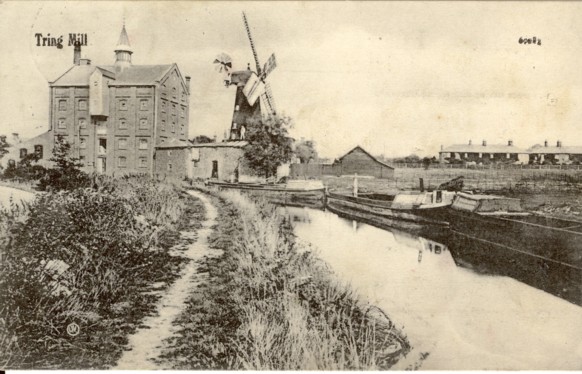 |
|
Gamnel Wharf, Tring. The steam flour mill dates from 1875.
Photo: Wendy Austin collection.
Massey's father, William, worked for the proprietor of the flour mill…
"… I know a poor old man in England who, for 40
years, worked for one firm and its three generations of proprietors. He
began at a wage of 16s. per week, and worked his way, as he grew older
and older, and many necessaries of life grew dearer and dearer, down to
six shillings a week, and still he kept on working, and would not give
up. At six shillings a week he broke a limb, and left work at last, being
pensioned off by the firm with a four-penny piece! I know whereof I
speak, for that man was my father."
GERALD MASSEY. |
|
"The
child comes into the world like a new coin with the stamp of God upon
it…the poor man’s child [is] hustled and sweated down in this bag of
society to get wealth out of it…so is the image of God worn from heart
and brow, and day by day the child recedes devil-ward. I look back now
with wonder, not that so few escape, but that any escape at all, to win
a nobler growth for their humanity. So blighting are the influences
which surround thousands in early life, to which I can bear such bitter
testimony." |
|
I
would not plod on, like these slaves of gold,
Who shut up their souls, in a dusky cave,
I would see the world better, and nobler-souled,
Ere I dream of Heaven in my green, turf-grave.
I may toil till my life is filled with dreariness,
Toil, till my heart is a wreck in its weariness,
Toil for ever, for tear-steept bread,
Till I go down to the silent dead.
But, by this yearning, this hoping, this aching,
I was not made merely for money-making.
from..... I
Was Not Made Merely for Money-Making |
|
On
Heaven, blood shall call,
Earth,
quake with pent thunder,
And
shackle and thrall,
Shall be riven asunder,
It will come, it shall come,
Impede it what may,
Up People! and welcome!
Your glorious day.
from.....The
Famine-Smitten |
|
At
the age of 15, Massey moved to London, where he found work as an errand boy, believed to have
been at the once famous
Regent Street store of Swan & Edgar.
With access to more reading material,
he flourished, absorbing the classics and other influences, including the
political writings of Thomas Paine, Volney and Howitt. He also studied French.
In later life Massey recalled that his first published poem on 'Hope' —
its author then being without
any — appeared in 1843 in the Aylesbury News, but this has not
been traced. His first
identified poem, At Eventide there shall be light,
was published in The Bucks Advertiser when he was eighteen, being attributed to "A Tring Peasant Boy".
A Tring bookseller published Massey’s first volume of poems, Original Poems and
Chansons,
in 1847, 250 copies being printed and offered for sale at a shilling each.
No copy is known to have survived (but see Early
Poems).
Throughout
his life, Massey was committed to the labourer’s cause. The revolutionary
spirit of the 1840s caught his enthusiasm and he joined the Chartists, applying
his pen in support of their cause. In 1849 he began editing
The Uxbridge Spirit of
Freedom, a paper written by working men, and was dismissed from several
jobs for publishing it.
Massey's Calvinist upbringing had taught him
that the Bible and church doctrines were true, but following his move to
London he realised that the social injustice that surrounded him was
plainly incompatible with strict church teachings. This dichotomy
was exacerbated when, having joined the Chartist movement, he came into
contact with political and religious radicals. At that time ― the
late 1840's and early 1850's ― there were discussions about and
publications refuting the strict historical veracity of biblical teachings (which continue
to this day). At that time, Massey’s sympathies veered to the
religious side of the reforming movement, where he supported the
Christian Socialists' ideals, acted as secretary to the Christian
Socialist Board and contributed to
The Christian Socialist
journal. In general, "Christian Socialism" was
taken to mean a restructuring of labour based on co-operation, joint
ownership and with increased power to the working class. F. D.
Maurice, who coined the term, intended that by these means to
Christianise socialism by opposing the unsocial Christians and the
unchristian socialists. Despite this association, however, Massey
also contributed more radical material to George Julian Harney's
Red Republican, sometimes under the pen names 'Bandiera' or 'Armand
Carrel', a venture with which the promoters of the Christian Socialist
disapproved.
|
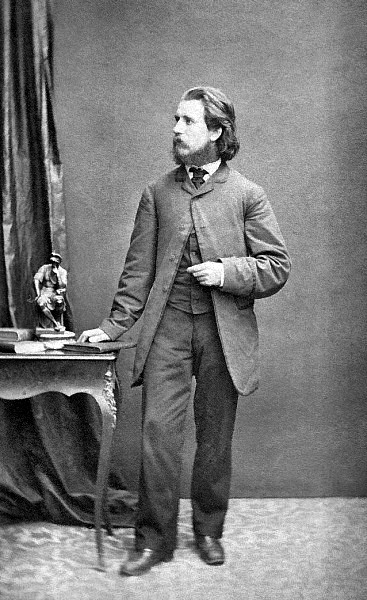 |
|
Massey, by John and Charles Watkins (ca. 1856) |
Following the virtual collapse of the Chartist
Movement by the mid 1850s, Massey continued to write poetry—much of
his poetry remaining religious in tone—together with literary articles and
reviews. His earliest surviving published
poetry collection, Voices of Freedom and Lyrics of
Love, appeared in 1851,
but it was not until his third collection, The Ballad of Babe Christabel
with other Lyrical Poems, published in 1854, that he achieved a wide
reputation as a poet. This volume went through five editions in a year and was
reprinted in New York (as Poems and
Ballads). The critic John Ruskin acknowledged Massey's talent, writing
to him; "Your education was a terrible one, but mine was far worse",
the one having suffered the bitterness of poverty, the other having been
the pampered child of wealth. War-Waits
― poems based on the Crimean War ― followed in 1855, Craigcrook Castle in 1856,
Robert Burns: a Centenary Song
(1859);
Havelock’s
March
in 1861 and, in 1870, A Tale of Eternity,
itself
a poem (and his last significant effort in the genre) dealing with the supernatural, on which
one critic commented
that ".... Weird, grisly, eerie, eldritch horror runs through the whole
current of the narrative". In 1886, in support of W. E.
Gladstone's election campaign, Massey penned a short collection of
political poems, which he published as "Election
Lyrics." Following the success of earlier compilations,
Massey collected the best of his poems into a two-volume edition, which with other material
was
published in 1889 as My Lyrical Life (Part
1, Part 2); a second, slightly extended
edition, appeared in 1896 (Part 3).
Massey's other published writing includes a detailed study of Shakespeare’s
sonnets. Following his essay on
the Sonnets published in the Quarterly Review in April, 1864,
Massey delved deeper in the mystery surrounding the characters that they
address. Shakespeare's Sonnets Never Before Interpreted
appeared in 1866 followed in 1872 by a revision, which Massey
published in a limited edition of 100 copies by subscription as The
Secret Drama of Shakespeare's Sonnets Unfolded: With the Characters Identified. A further revision,
The Secret Drama of Shakspeare's Sonnets,
which followed in 1888, exhibited an improved literary style (Massey's
spelling of 'Shakspeare' appears to have been taken from Ben Johnson,
among others, and is a recognised, though less used variant).
|
|
"That
Spanish Emperor who fancied he could have improved the plan of creation
if he had been consulted, would hardly have managed to better the time,
the place, and circumstances of Shakespeare's birth. The world would not
have been more ripe, or England more ready - the stage of the national
life more nobly peopled - the scenes more fittingly draped - than they
were for his reception. It was a time when souls were made in earnest,
and life grew quick within and large without. The full-statured sprit of
the nation had just found its sea-legs and was clothing itself with
wings." |
|
|
"It
must be borne in mind that we are endeavouring to decipher a secret
history of an unexampled kind. We can get little help, except from the
words themselves. We must not be too confident of walking by our own
light; we must rely more implicitly on that inner light of the sonnets,
left like a lamp in a tomb of old, which will lead us with the greater
certainty to the precise spot where we shall touch the secret spring and
make clear the mystery. We must ponder any the least minutiae of
thought, feeling, or expression, and not pass over one mote of meaning
because we do not easily see its significance. Some little thing that we
cannot make fit with the old reading may be the key to the right
interpretation." |
|
|
Gerald Massey.... extracts from
The Secret Drama of Shakespeare's Sonnets
Unfolded.
Among Massey's radical friends and associates during his
Chartist years were W. J. Linton,
Thomas Cooper,
G. J. Holyoake,
Ernest Jones,
J. J. Bezer,
John Arnott, F. D. Maurice and Charles
Kingsley. Later, when he had established his literary reputation,
came Hepworth Dixon, Walter Savage
Landor and George Eliot, who is widely reported to have taken Massey as
her model for the character of Felix Holt in "The Radical," although
there is no hard evidence to support this. Somewhat later came
Robert Browning (who Massey met at the establishment of Lady Marion
Alford, his patron, at Ashridge in Hertfordshire ― see Massey's
letter in defence of
Browning) and the poetess, novelist and author of charming children's stories,
Jean Ingelow, to whom, following the death of
his first wife, Rosina, in 1866, it was rumoured that Massey proposed marriage
(another rumour of this period linked Jean Ingelow with Robert
Browning).
This period, 1869-70, saw the publication of A
Tale of Eternity and other poems, the last of Massey's
significant poetry; it also marked the end of Massey's long
association (and for him, a comparatively regular stipend) as a poetry
reviewer for the influential periodical, the Athenæum. The
cause of the break is unknown, but in a letter to another of the
journal's reviewers, Thomas Purnell, Massey hints at a 'falling out' . .
.
Curiously enough I had corresponded with the ‘Athm.’ people about
resuming my old seat on their Critical bench. But, after one
meeting and your communication, I shall drop the subject and not ask for
any Books. The whole affair is infinitely funny.
Thereafter Massey all but abandoned poetry and commenced
his long research into religious origins. His 'trilogy' ("The Book
of the Beginnings", "The Natural Genesis" and "Ancient Egypt: The Light
of the World"), published between 1881 and
1907, demonstrates clearly his complete change of thought regarding the
organised religions of the day and his firm alignment to the concept of
evolution; whilst he did not become an atheist, he might be classed as a deist
(i.e. "One who believes in the existence of a God or supreme being but
denies revealed religion, basing his belief on the light of nature and
reason").
A misconception about Massey's religious
beliefs stems from his connection with the Most Ancient Order of Druids to
which he was elected Chosen Chief, an honorary position that he held from
1880 until 1906. The position might have involved some minor administrative duties,
but it required no formal membership. To Massey, at least, it was not a
religion and did not involve forms of initiation, ceremonial dress or
attendance at active meetings at megalithic sites; indeed, Massey did
not believe in such pagan ceremony and made his interest in the Druids
plain . . . .
"I cannot join in the new masquerade and
simulation of ancient mysteries manufactured in our time by Theosophists,
Hermeneutists, pseudo-Esoterics, and Occultists of various orders,
howsoever profound their pretensions. The very essence of all such
mysteries as are got up from the refuse leavings of the past is pretence,
imposition, and imposture. The only interest I take in the ancient
mysteries is in ascertaining how they originated, in verifying their
alleged phenomena, in knowing what they meant, on purpose to publish the
knowledge as soon and as widely as possible." (vide Massey's response to
the Blavatsky letter, Agnostic Journal, 1891).
Original editions of most of Massey's books are available on the antiquarian
book market
(but, in good condition, can
command high prices) and most of his work is also now available in modern reprints. Copies of all Massey's major published work are held by the
British Library, at
British & Irish university libraries, and in
the US Library of Congress. |
|
Day
after day her dainty hands
Make Life's soiled temples clean,
And there's a wake of glory where
Her spirit pure hath been.
At midnight, through that shadow-land,
Her living face doth gleam;
The dying kiss her shadow, and
The Dead smile in their dream.
.....on
Florence Nightingale,
from
War Waits
|
|
In
silence sat our Crimean Hero, he
Who told us how they fought at Inkerman:
His heart swam up in tears at thoughts of
Home.
The roar and rack of Battle over and gone;
No more surprises in the bloody trench,
Where midnight swarmed with visions horrible,
And earth was like a fiery coast of hell!
All that long aching wintriness of soul,
Warm-melted in the arms of Wedded Love,
That drew him from the bloody battle-press,
And claspt him safe in their serene heaven,
Where Past and Future crown him as they
kiss.
And with dumb eloquence his poor armstump
moved,
As it were dreaming of a dear embrace.
from...Craigcrook
Castle
|
|
Up-rouse
ye now, brave brother-band;
With honest heart, and working hand:
We are but few, toil-tried and true,
Yet hearts beat high to dare and do.
And who would not a champion be,
In Labour's social Chivalry?
from....The
Chivalry of Labour |
|
In addition to his books and journalism, Massey
sought a living from contributions to periodical magazines, among others
being Chambers' Magazine, Cassell's Magazine, All the Year Round, and Good Words—the
first issue of this once-popular periodical (in 1860) includes a poem on the
great Italian unifier Garibaldi, for which Massey received ten guineas. He
also contributed to
literary journals, including Hogg's Instructor, Fraser's
Magazine, the North
British Review, the Quarterly
Review and the
Athenæum.
Massey also lectured widely in the U.K., mainly,
in his earlier years, on literature, poetry and pre-Raphaelite art, his
fiery style proving popular and often attracting large audiences—Professor
Marvin Vincent, an American theologian, described him thus:
"He is a splendid lecturer. He went off like the eighty-one ton pounder.
I didn't agree with his opening remarks, but it was like a shell
bursting among us, and we had enough to do to look out during the rest
of the lecture". In later years Massey undertook lecturing tours to North America; the first, in 1873-74, included
California and Canada, the second in 1883-85 extended to Australia and New
Zealand, but his third tour of the U.S.A. came to a
premature close when he was called home to be with his dying daughter, Hesper, for whom he had a particular affection. By this time he was lecturing chiefly on the subjects that
absorbed his later life, spiritualism, mythology and the mystical interpretation
of the Scriptures; in 1887 Massey published a selection of his
lectures on these topics.
―――♦―――
Massey
was twice married. He had 7 daughters and 2 sons (neither of whom reached
maturity), including two surviving
daughters from his first marriage.
|
My Love in Heaven! love was not hid
By closing of a Coffin-lid!
Dear Love in Heaven! true love survives
All separation in our lives!
O Love in Heaven, from you I win
Sure help without, and hope within!
My Love in Heaven, for me she waits
Like Morning golden at her Gate
from....Open
Sight
|
Massey's first wife, Rosina Jane Knowles, was a noted
clairvoyant. She was born in Bolton
in Lancashire and was nineteen when they married in 1850.
Rosina was to influence Massey's life significantly,
particularly his interest in and commitment to spiritualism. Sadly, she
was to develop severe depression, possibly stemming from the loss of two
of her children, a condition that was aggravated by growing dependence
on alcohol. She died in 1866 at the age of thirty-four—her badly weathered white
tombstone,
her name barely discernable, lies
near the gate of the beautiful secluded parish church of Saint Peter and Saint
Paul at Little Gaddesden near Tring. |
|
Massey's second
wife, Eva Byrn, who he married in 1868, was the daughter of an artist
and 'Professor of Dancing'. A contemporary magazine article
described Eva as accomplished and beautiful while referring to Massey as
having . . .
"a young, fresh look; a finely-formed head, too large for the small,
spare body; a pleasant, winning face, and long, dark brown hair,
whiskers, and moustache".
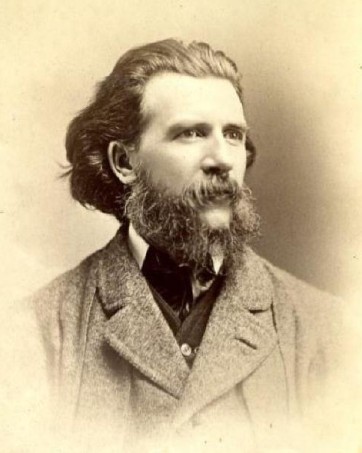 |
|
Gerald Massey—probably
early 1860s.
Photograph is
possibly by John & Charles Watkins. |
Some years earlier (1854) the poet and critic Sydney Dobell
(1824-74) described Massey thus:
"The upper part of his face reminds me of Raphael's angels, and I
catch myself dwelling upon him with a kind of optical fondness, as one
looks upon a beautiful picture or a rare colour. And this in spite
of a blue satin waistcoat! and a gold-coloured tie! The second
morning I came upon him early, sans neckerchief or collar, nursing his
sickly baby, the grey wrapper in which he sat, being like the mist to
the morning as regards his wonderful complexion, and it would be
difficult to imagine more marvellous (masculine) beauty . . ."

Massey ca. 1854.
. . . . while after the passage of 30 years (1884), during his second
lecturing tour of the U.S.A.
an American journalist
found Massey to be:
"… at the grand climacteric of life; and is below the medium stature.
Grey whiskers, of English trim, half mask a face which wears a look of
intensity as he plows through the mystical domains of Egyptology and the
shadowlands of the ancient Orient. Brown hair, with occasional
streaks of grey, rolls forward in a billow on his crown, and ripples off
from the ears. He wears spectacles when he reads from manuscript."
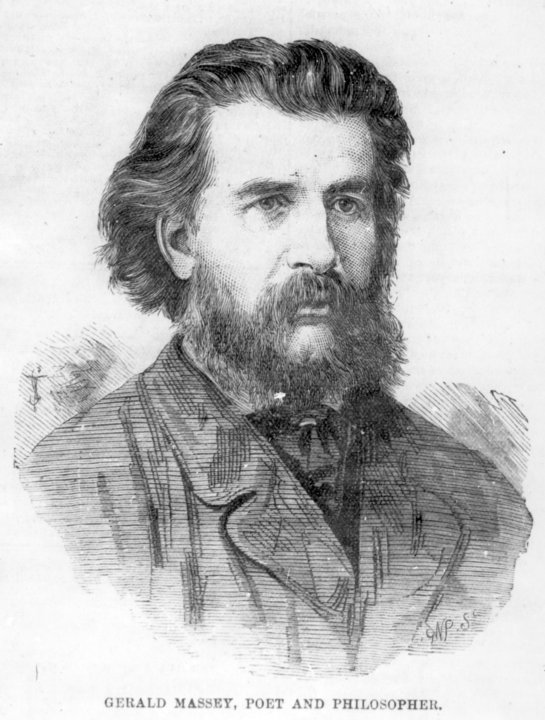
A careworn Massey: a sketch from a
photograph taken
during his first American lecture tour, 1873.
While Eva does not appear to have had any discernable
impact on Massey's work, she undoubtedly brought stability to his
domestic life. Sadly, few of Massey's children by either
marriage survived into adulthood and with the death of his grand
daughter, Helena Viola, in 1988, his direct line came to an end.
Of his three brothers, Frederick left
numerous descendants and his line survives to this day. |
|
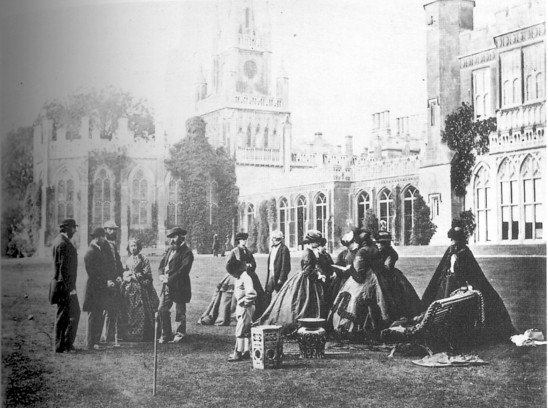 |
|
Ashridge: the residence of Lord Brownlow and his mother, Lady Marion
Alford.
|
|
Throughout his life Massey was beset with money problems, sometimes
having to borrow from friends. Although he eventually received a
civil list pension of £100 per annum—which must be judged by the
standards of the time—having to care for Rosina and a large family
exacerbated his already precarious existence as a writer and travelling
lecturer. Massey was fortunate, however, in securing the patronage
of Lady Marion Alford, mother of the wealthy owner of the Ashridge
Estate near Tring.
|
Of
such as he was, there be few on earth;
Of such as he is, there are few in Heaven:
And life is all the sweeter that he lived,
And all he loved more sacred for his sake:
And Death is all the brighter that he died,
And Heaven is all the happier that he's there.
From....In
Memoriam (to
Earl Brownlow) |
In 1865, Lord Brownlow settled Massey’s debts and
provided him and his family with an estate cottage in the village of Little
Gaddesden. However, Rosina's unbalanced state of mind—made worse by alcoholism—and her abilities as a clairvoyant aroused deep superstitions in the villagers,
who came to believe her to be a witch. The Brownlows again came to the
rescue, providing Massey with a large isolated farmhouse, Ward's
Hurst, where
he lived rent-free until 1877 when he moved to London. It was mainly during the period
at Wards Hurst that
Massey developed an interest in psychic phenomena that was to absorb his later
years, years in which he dropped from public view and in which there is little
record of his life.
Impecunious to the end, Massey died at his home in South Norwood
Hill, London, on the 29th of October 1907, and was laid to rest
in the family tomb in
London’s old Southgate Cemetery. Like many men of action and enterprise he was his own
educator, attending the best school that has ever existed since
men began their search for knowledge, the School of Experience,
wherein he became in his particular field—unravelling the mysteries of ancient Egyptian
mythology and elucidating its parallels with western religions—one
of its most distinguished graduates. . . ."It is a work which has
occupied me over thirty years, and I shall be well content if in
another century my ideas are acknowledged as correct".
|
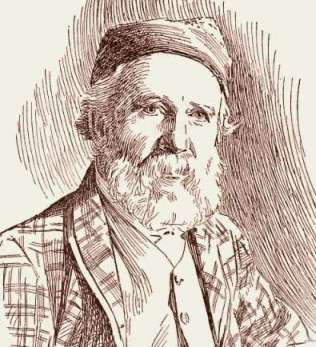
|
Gone
are the last faint flashes,
Set is the sun of my years;
And over a few poor ashes,
I sit in my darkness and tears.
Massey,
from....Desolate |
|
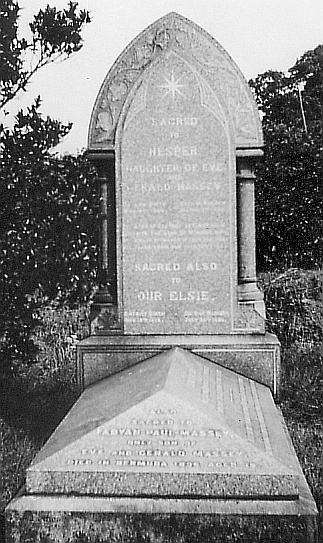 |
|
――――♦――――
|
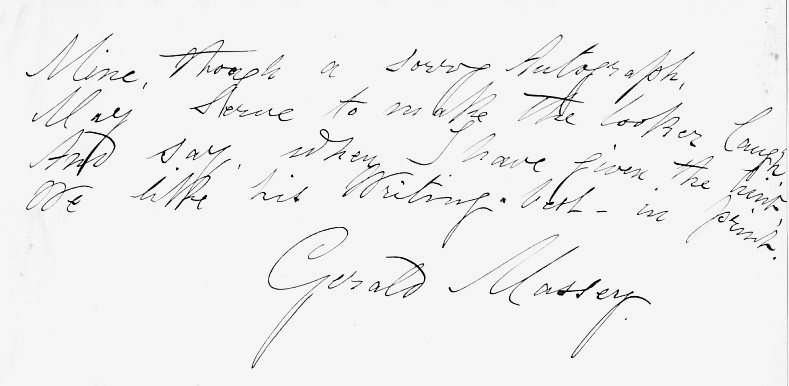
|
|
Mine, though a sorry Autograph,
May serve to make the looker laugh,
And say when I have given the hint,
We like his writing best—in print. |
|
――――♦――――

<>
|
